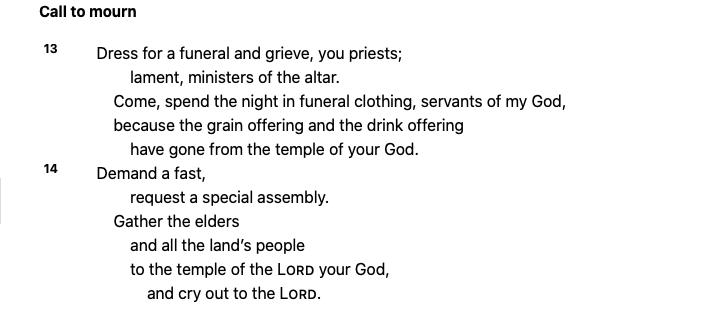The Prophet Joel

The book of Joel is a short book–only three chapters in length. But, just as with all of the prophets, Joel’s message resounds and holds great importance to this period of prophetic speech within Israel’s history. As the reign of kings in both the northern and southern kingdoms is coming to an end, these prophets share the word of the Lord in shocking, frightening, and yet also straightforward ways. In fact, Joel includes instructions on how to return to God in Joel 2:12-13.
But, before Joel can get to that message, he begins with a message of lamentation and mourning. It is as if Joel wants us to know that we must feel the weight and the gravity of how dire the situation is in God’s eyes. The only appropriate response is mourning. Mourning because of the loss of relationship with God. Mourning because of the failure of the people of God to live as the people of God ought to. Mourning because of the pain and hurt caused by the lack of faithfulness to God and to God’s instructions. Mourning for all the people.
And that can be a difficult pill to swallow, so to speak. Especially for people in our part of the world and in our time in history–mourning is likely the last thing that many of us want to do. But, as the verses above indicate, Joel calls the nation to a stance of mourning.
We might think of it in this way–when Jesus encounters a family that he knows and loves well in John 11 (Mary, Martha, and Lazarus), Jesus comes to them in the midst of their mourning. He comes to them days too late, after Lazarus has died of an illness, and the sisters are distraught. Martha wonders and even nearly accuses Jesus because of his lateness, and Mary initially can’t even bring herself to leave the house. When she finally does go to meet Jesus, he asks to be shown to where Lazarus has been laid to rest.
And now, for those of us who are familiar with the story, we anticipate that Jesus is curious to know this so that he can heal Lazarus. We think this primarily because we already know that he is going to do so. However, there is something that comes first. There is John 11:35–the verse that contains so little, and yet speaks so largely to what Joel too is trying to teach the people of God–“Jesus wept.”
It’s a short verse, and one that many enjoy bringing out for trivia (i.e. “do you know the shortest verse in the New Testament?”) with their friends and family. But it also communicates something about the nature of God that we see in Christ, and that we see in the book of Joel. This is a God who mourns. This is a God who invites us to mourn as well. God even blesses those who mourn (Matthew 5:4).
As we read these verses in the book of Joel, we should understand that the reason that God invites the people to mourn and prepare for a funeral is because that is what God is doing. God is grieved at the status of the relationship of those who are meant to be God’s chosen, covenanted people.
This, too, is something that helps us to understand the prophetic books, as well as to give us hope. God cares enough to mourn. God cares enough to grieve. God cares enough to scold, to discipline, and to rebuke. God has not and will not abandon the people who have covenanted with God. Instead, God seeks repentance. God seeks a change of heart. God keeps the doorway open for even someone who has turned their back on God.
When we think of God, we might think of either positive or negative images, based largely on our experiences or interpretations of our experiences. But the prophets speak emphatically, no matter what our experiences tell us, that God loves this creation and the created enough to mourn and grieve over us. This gives me hope. For I know that God has not and will not turn away from me. Instead, God comes toward me–even as a mourner. And just like in John 11, God comes toward me able to call me to new life. To offer me a fresh chance to be the image-bearer of God that I was created to be. And God does the same for you.

